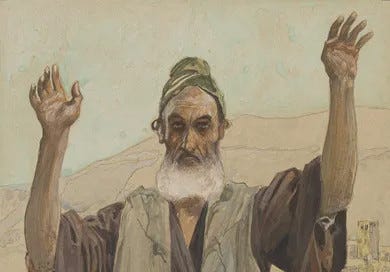The Prophet Ḥabakkuk by James Tissot (bio). On display at the Jewish Museum in New York City.
Gimme Some Torah #266
Welcome to new subscriber Dar****!
לְפָנָ֖יו יֵ֣לֶךְ דָּ֑בֶר וְיֵצֵ֥א רֶ֖שֶׁף לְרַגְלָֽיו׃
Pestilence marches in front,
And plague comes forth at God’s heels.
The Torah reading this Shabbat is the reading assigned to the second day o…
Keep reading with a 7-day free trial
Subscribe to Gimme Some Torah to keep reading this post and get 7 days of free access to the full post archives.




